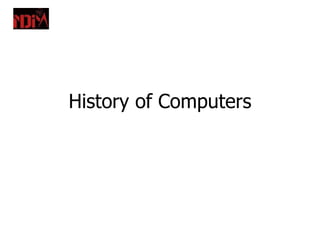
Lecture 2
- 2. Evolution of Computers Idea of computing is as old as the civilisation itself. 1450 B.C. Abacus • The first known calculating device. • Made by the Chinese. • A wooden frame with a number of wires with beads strung through them. • Beads were used for counting and calculations. •To show a number, beads were pulled down so that each rod represented a digit.
- 3. Evolution of Computers 1600 Napier Bones • Counting device for multiplication • Invented by John Napier, a Scottish Mathematician. • Strips with numbers written on them. • Stripes were arranged properly to read the numbers in adjacent columns to get the answer of multiplication operation.
- 4. Evolution of Computers 1642 A.D. Adding Machine • Invented by the French scientist & mathematician Blaise Pascal. • The machine used to perform addition and subtraction operations. • Also known as Pascaline.
- 5. Evolution of Computers 1692 A.D. Multiplying Machine • The German scientist Gottfried Leibnitz improved Pascal’s machine. • It was a calculator, used to perform addition, subtraction, multiplication and division operations accurately.
- 6. Evolution of Computers 1813 A.D. Difference Engine • Invented by Charles Babbage, an English man. • Used to perform complex calculations and print them out.
- 7. Evolution of Computers Early 1800’s Jacquard Loom • Developed by a French weaver Joseph Marie Jacquard. • A programmable loom having large cards and holes punched in them. • Output was a geometric pattern on a thick cloth.
- 8. Evolution of Computers 1862 Arithrometer • Developed by a Frenchman Charles Xavier Thomas. • Used to perform addition, subtraction, multiplication, division and square root functions accurately.
- 9. Evolution of Computers 1863 A.D. Analytic Engine • Made by Charles Babbage, the “Father of Computers”. • Used to perform long complex calculations. • Used to store 1000, 50-digit numbers per second. • Used to multiply 20-digit numbers/ 3 minutes
- 10. Evolution of Computers 1943 A.D. ENIAC • Electronic Numerical Integrator And Calculator made by the Harvard University. •The first electronic computer. • It was of 5 tons, used to occupy 2 big rooms. • Used to perform all the calculation like a calculator.
- 11. Evolution of Computers 1947 A.D. EDSAC • Electronic Delayed Storage And Calculations made by Cambridge University, England. • The first Electronic Computer which used to calculate and store the data.
- 12. Evolution of Computers 1951 A.D. UNIVAC - I •The first Commercial Computer introduced by Sperry Rand Corporation, USA.
- 14. Early Electronic Computers 1930- Turing Machine: • Made by an English Mathematician, Alan. • A hypothetical general purpose Computing Machine which could test Artificial Intelligence. 1939-ABC(Atanastoff Berry Computer): • Made by Prof. John Atanasoff. • The first special purpose computer and was basically an electronic calculating machine to solve equations.
- 15. Early Electronic Computers 1944- Mark I • Made by Dr Howard Aiken • An electro-mechanical computer, could perform a multipication in 3-5 secs. • 8 feet high and 55 feet long. • Used to perform single multiplication operations.
- 16. Early Electronic Computers 1940’s Mark-I • Made by Dr. John Mauchy, University of Pennsylvania, USA. • An electro-mechanical machine to mainly calculate missile trajectories. • But machine was not able to complete the calculations, two months after the war ended.
- 17. Characteristics of a Computer
- 18. Characteristics of a Computer 1. Fast • Able to process data & give output in fractions of second. • A Powerful computer is capable of executing about 3 millions calculations/second. 2. Accurate • In spite of its high speed, error hardly occurs as its accuracy is consistently high enough.
- 19. Characteristics of a Computer 3. Reliable • The output generated by the computer is very reliable. • But for reliable output, input should also be reliable. 4. Large Storage Capacity It can store huge data in small storage devices. 5. Versatile It can work upon numbers, graphics, audio, video etc. making it really versatile.
- 20. Characteristics of a Computer 6. Works Automatically Once the instructions in the form of program are fed, it works automatically without any human help until the completion of that task. 7. Diligent It never feels tired & distracted. Its performance is constant. 8. No Emotions Computers do not have emotional, ego & psychological problems which are destructive in nature.
- 21. Characteristics of a Computer 9. No IQ Computer works as a very good assistant as it has no IQ. It 100% obeys the user.
